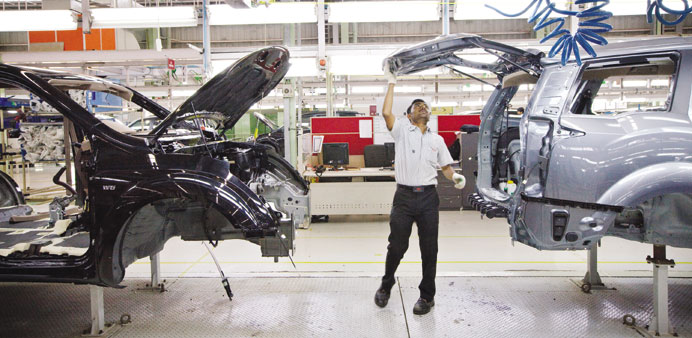An employee works at the assembly line of the Mahindra & Mahindra in Chakan, Maharashtra. Activity in India’s services industry contracted for a tenth straight month in April, a business survey showed yesterday.
Activity in India’s services industry contracted for a tenth straight month in April, pushing firms to put hiring plans on hold for the first time since November, a business survey showed yesterday.
The HSBC Services Purchasing Managers’ Index, compiled by Markit, rose to 48.5 in April from 47.5 in March, but held stubbornly below the 50-mark that divides growth from contraction.
“While the business activity index improved, it remained below the water line. This points to still subdued service sector activity,” said Leif Eskesen, chief economist for India and Asean at HSBC.
New business fell at a slower pace in April but the employment sub-index slipped just below the 50-level to 49.8 as firms reacted to falling workloads.
Still, firms remained optimistic about the future, possibly due to an anticipated victory for the business-friendly opposition Bharatiya Janata Party (BJP) in an ongoing election in the world’s largest democracy.
Yesterday’s business survey also showed input costs and prices charged by services companies increased at a quicker pace last month.
In contrast, input and output prices rose at the slowest pace in about a year among Indian factories, a similar poll of manufacturers found last week.
Indian factory growth showed no sign of acceleration last month as tepid demand restrained output even as price pressures eased.
The mixed picture will give little reason for the Reserve Bank of India (RBI) to change its key interest rate from 8% and a Reuters poll of economists in March said the bank would hold steady until October at least.
Meanwhile, growth in China’s factory output and investment likely stabilised in April as the government uses targeted policy measures to underpin growth, while the pace of declines in exports and imports may have eased, a Reuters poll showed. However, the world’s second-largest economy may only get a temporary boost from such policy support, as growth will inevitably slow while the government seeks to tackle high debt levels and excessive factory capacity.
China’s industrial output may have grown 8.9% in April from a year earlier, slightly ahead of the 8.8% rise in March, according to the poll of 18 economists.
Fixed-asset investment growth likely grew 17.7% in the first four months from a year earlier, also slightly firmer than the 17.6% pace seen in the first three months. The government only publishes cumulative investment data.
The government has in recent weeks hastened construction of railways and affordable housing and cut taxes for small firms to support the slowing economy, but top leaders ruled out any forceful policy measures in favour of reforms.
“Economic growth is stabilising but it’s hard to see a rebound because policies that help stabilise growth are limited,” Peng Wensheng, chief economist at CICC said in a research note.

